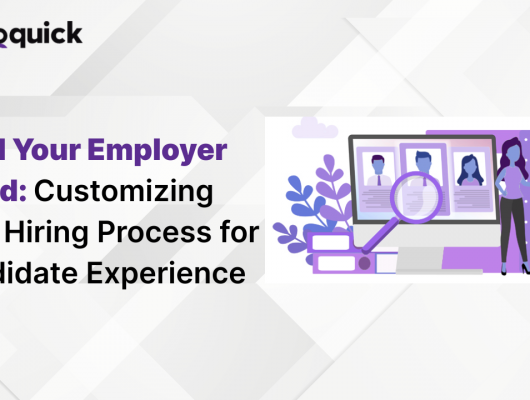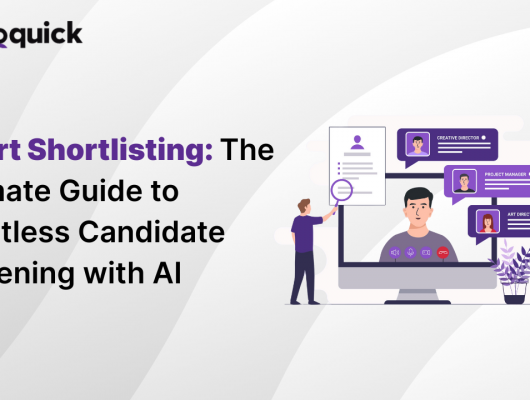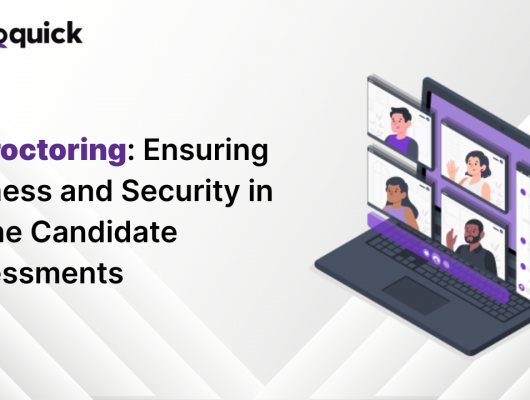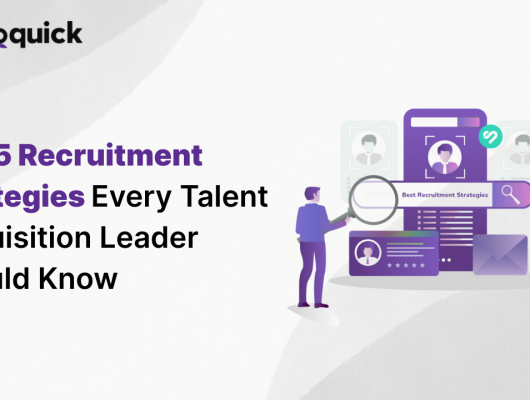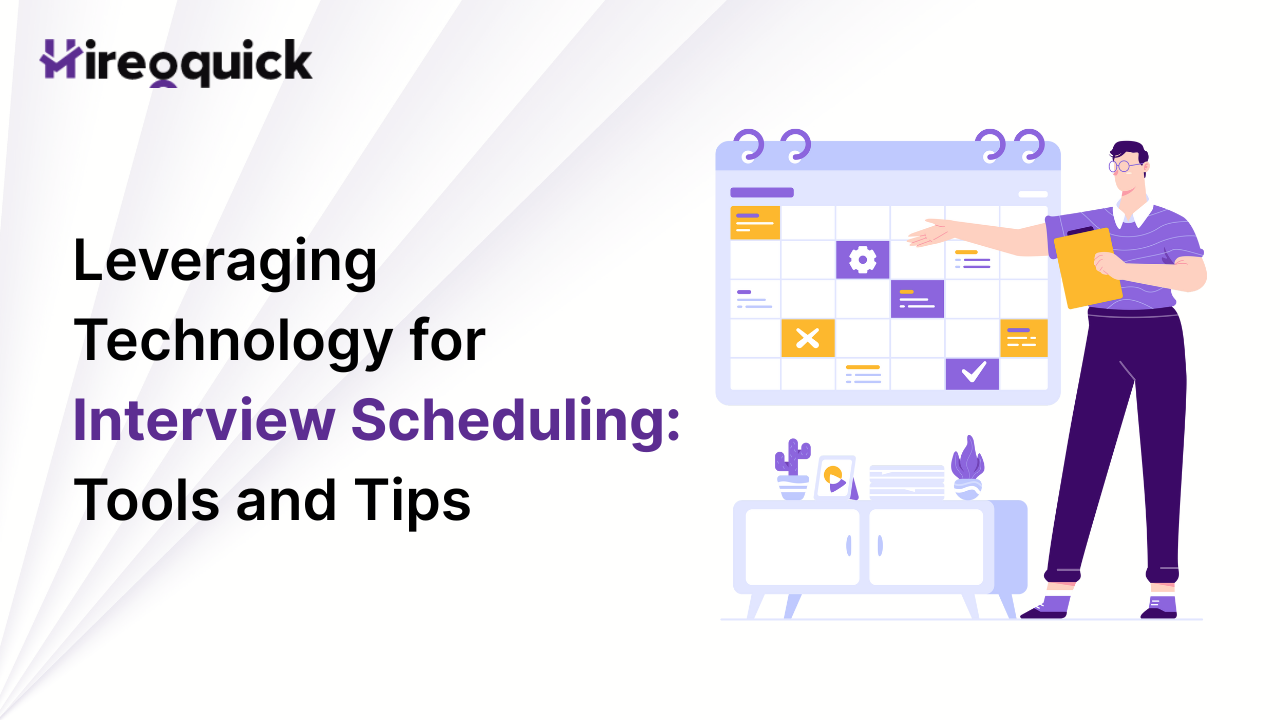
Interview scheduling is often one of the most frustrating and time-consuming tasks in the hiring process. Coordinating calendars, juggling multiple interviews, and ensuring no overlaps or mistakes can quickly become overwhelming, especially as the volume of applicants increases. For HR teams and hiring managers, managing the logistics of interviews is often just as challenging as selecting the right candidates.
However, with the right technology and a strategic approach, interview scheduling can become a much simpler and more efficient process. By leveraging various scheduling tools and automation, organizations can streamline the process, improve communication, and ultimately provide a better candidate experience.Let’s dive into the importance of effective interview scheduling and how to leverage technology to make the process smoother and more efficient for all involved.
The Importance of Effective Interview Scheduling
Before we explore the tools and tips for streamlining interview scheduling, it’s essential to understand why it matters so much. Interview scheduling is a pivotal part of the hiring process that goes beyond simply finding a time to meet with a candidate. A poorly scheduled interview can result in confusion, frustration, and even the loss of top talent.To explore more insights on effective recruitment strategies and how to improve your hiring processes, visit Glassdoor’s guide on improving your hiring process.Here are some key reasons why effective interview scheduling is so important:
Improved Candidate Experience:
Candidates who experience delays, confusion, or technical issues with scheduling may have a negative perception of your company. A seamless scheduling process ensures a positive candidate experience from the first interaction.
Better Time Management:
For HR teams and interviewers, scheduling tools help save valuable time that would otherwise be spent manually coordinating with candidates.
Increased Interview Completion Rates:
Automated reminders and easy-to-use scheduling tools reduce the chances of missed interviews or late cancellations, leading to more interviews being successfully completed.
Streamlined Collaboration:
Interview scheduling tools allow HR teams, hiring managers, and other interviewers to coordinate easily, ensuring that everyone is on the same page.
How Technology Enhances the Interview Scheduling Process
Advancements in technology have revolutionized the way we approach interview scheduling. Automated tools and integrated platforms can significantly reduce the manual effort involved in coordinating interviews. Let’s explore some of the top benefits and tools that make this process easier.
Automated Scheduling
One of the main advantages of leveraging technology in interview scheduling is automation. Rather than back-and-forth emails to find a suitable time, automated scheduling tools allow candidates to select an available slot from pre-set time options. This eliminates the need for multiple communications and minimizes the risk of scheduling errors.
Tools like Calendly, Doodle, and YouCanBookMe make it easy for both HR Tech teams and candidates to view available time slots and choose the most convenient option. With these tools, HR professionals no longer need to worry about double-bookings, time zone confusion, or overlapping interviews.
Real-Time Calendar Synchronization
Gone are the days of managing multiple calendars and worrying about whether interviewers and candidates are available at the same time. Many interview scheduling tools integrate directly with popular calendar platforms like Google Calendar, Microsoft Outlook, and Apple Calendar.
This synchronization ensures that all participants’ calendars are updated in real-time, providing a seamless experience for both interviewers and candidates. It helps to eliminate scheduling conflicts and ensures that both interviewers and candidates receive timely reminders and updates about upcoming interviews.
Customizable Interview Slots
Every organization has different needs when it comes to interview scheduling. Some might prefer longer interview times, while others may have more compact schedules. The best interview scheduling tools allow HR professionals to set customizable time slots based on their unique preferences and requirements.
Candidates can then select from the available time slots, making the process more efficient. This customization helps HR teams better manage their time, ensuring that there are no overlaps or unnecessary gaps between interviews.
Video Interview Integration
As remote work and virtual interviews have become increasingly common, scheduling tools with integrated video conferencing capabilities have become essential. Platforms like Zoom, Microsoft Teams, and Google Meet can easily be integrated with interview scheduling tools, eliminating the need to manually send out separate meeting links.
By automatically generating and sharing video links along with interview invitations, these tools ensure that remote interviews are as seamless as in-person meetings. Candidates can focus on preparing for the interview, not on logging into a meeting platform.
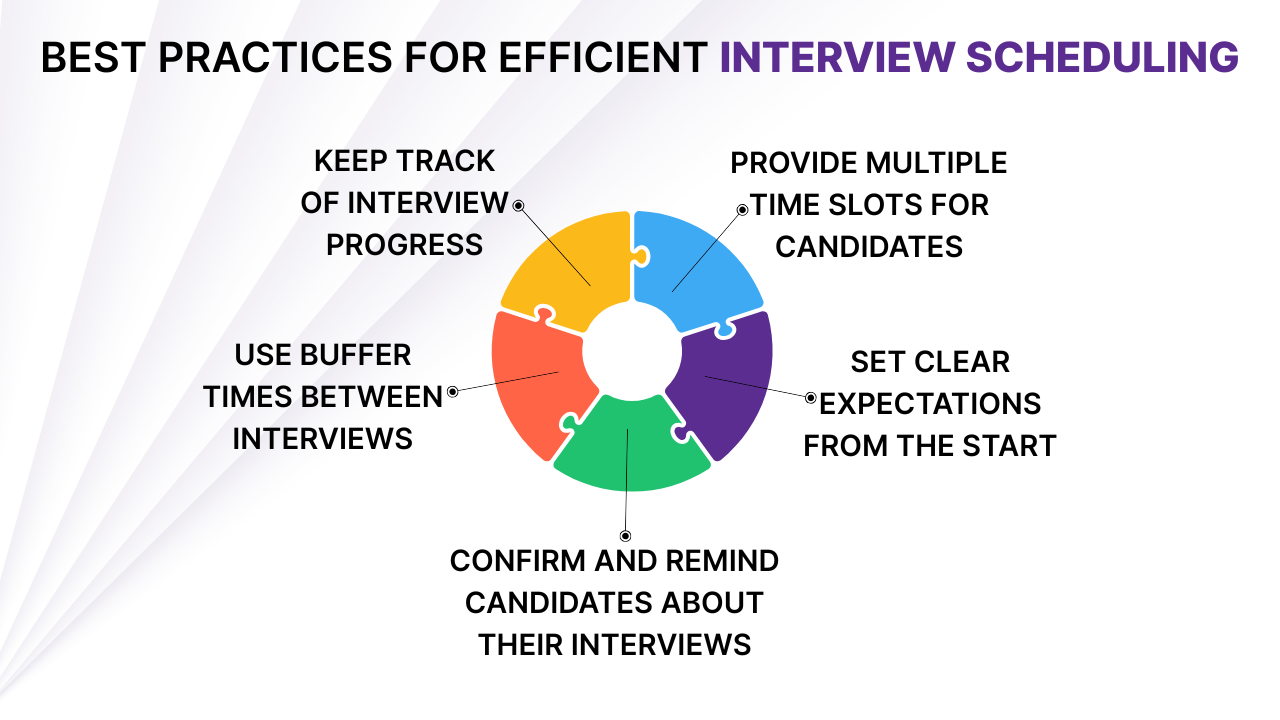
Best Practices for Efficient Interview Scheduling
While technology plays a significant role in optimizing the scheduling process, there are several best practices that can further streamline the experience. Here are some tips for getting the most out of your interview scheduling tools.
Set Clear Expectations from the Start
From the very beginning, ensure that candidates understand the interview scheduling process. Let them know how and when they’ll receive an invitation, what to expect during the interview, and how to reschedule or cancel if necessary. Clear communication upfront reduces confusion and sets a positive tone for the rest of the interview process.
Use Buffer Times Between Interviews
Interviewers often need time to review the previous candidate’s responses and prepare for the next. By setting buffer times between interviews, you allow yourself the necessary space to reset between sessions, whether it’s for a brief break or catching up on notes.Additionally, buffer times help account for potential delays in previous interviews, reducing the likelihood of back-to-back scheduling conflicts.
Provide Multiple Time Slots for Candidates
Giving candidates a variety of time options makes it more likely that they’ll find a time that works for them. Providing flexibility can also help reduce no-shows and cancellations. Whether it’s offering morning, afternoon, or evening slots, giving candidates the opportunity to choose makes them feel valued and increases the chances of securing an interview.
Confirm and Remind Candidates About Their Interviews
While automated scheduling tools can send out reminders, it’s always a good idea to confirm the interview details a few hours or a day before. This confirmation ensures that candidates are still available and that all the necessary materials are prepared, such as interview questions or candidate assessments. You can also automate reminder emails, ensuring that both interviewers and candidates receive timely notifications.
Keep Track of Interview Progress
Efficient scheduling tools help keep track of the interview process. Many platforms allow you to mark whether interviews are completed, rescheduled, or canceled. This makes it easier for HR teams to monitor the recruitment process and make adjustments as necessary.
Leveraging HireOquick for Seamless Interview Scheduling
For businesses looking to further optimize their interview scheduling process, HireOquick provides a comprehensive recruitment platform that goes beyond basic scheduling.
With AI-powered scheduling and integrated video interviewing features, HireOquick simplifies the entire recruitment journey. Hiring managers can quickly schedule interviews by selecting available time slots, send automatic reminders, and even conduct video interviews—all within the same platform.
What sets HireOquick apart is its ability to combine multiple recruitment tools into one platform. From job posting and candidate assessments to interview scheduling and onboarding, HireOquick streamlines the entire hiring process, reducing the need for multiple third-party tools.
By leveraging AI-powered features, HireOquick helps HR teams automate the tedious parts of the hiring process, such as resume parsing and candidate shortlisting, leaving more time for strategic decision-making.
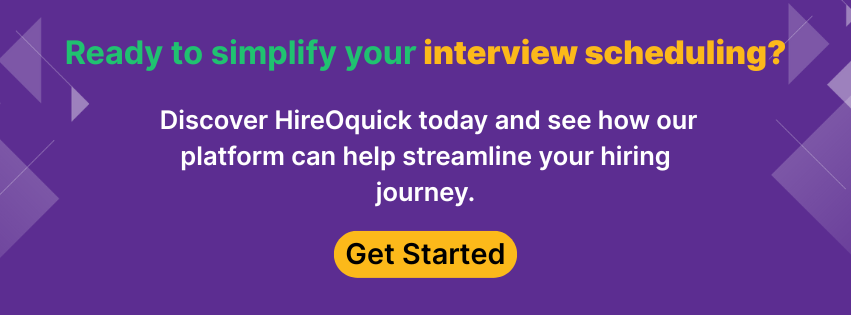
Wrapping Up: Streamline Your Interview Scheduling Today
Interview scheduling doesn’t have to be a stressful or time-consuming part of the recruitment process. By adopting the right tools, using best practices, and integrating automation, HR teams and hiring managers can significantly reduce the time and effort spent on scheduling interviews.
From real-time calendar syncing to customizable time slots and integrated video conferencing, technology has made interview scheduling easier, faster, and more efficient than ever. And with platforms like HireOquick, businesses can further enhance their recruitment processes, saving time and offering a better experience for candidates and HR teams alike.
Don’t let interview scheduling bog down your hiring process—embrace the power of automation and get back to focusing on what matters: hiring top talent.
Conclusion: Streamline Your Hiring Process with Technology
In an increasingly fast-paced business environment, efficient interview scheduling is no longer a luxury—it’s a necessity. With the right tools and technology, HR teams can save time, reduce scheduling conflicts, and enhance the candidate experience, all while keeping the recruitment process organized and streamlined.
By leveraging automated interview scheduling tools, integrating video conferencing, and following best practices for communication and coordination, you ensure that your recruitment process runs smoothly, even as the volume of candidates increases. The right technology empowers you to focus more on making informed hiring decisions and less on the logistics of scheduling.
For those seeking an all-in-one recruitment solution that goes beyond just interview scheduling, HireOquick offers a comprehensive platform that combines AI-powered scheduling, candidate assessments, and video interviews, ensuring a seamless experience for both candidates and HR teams.

